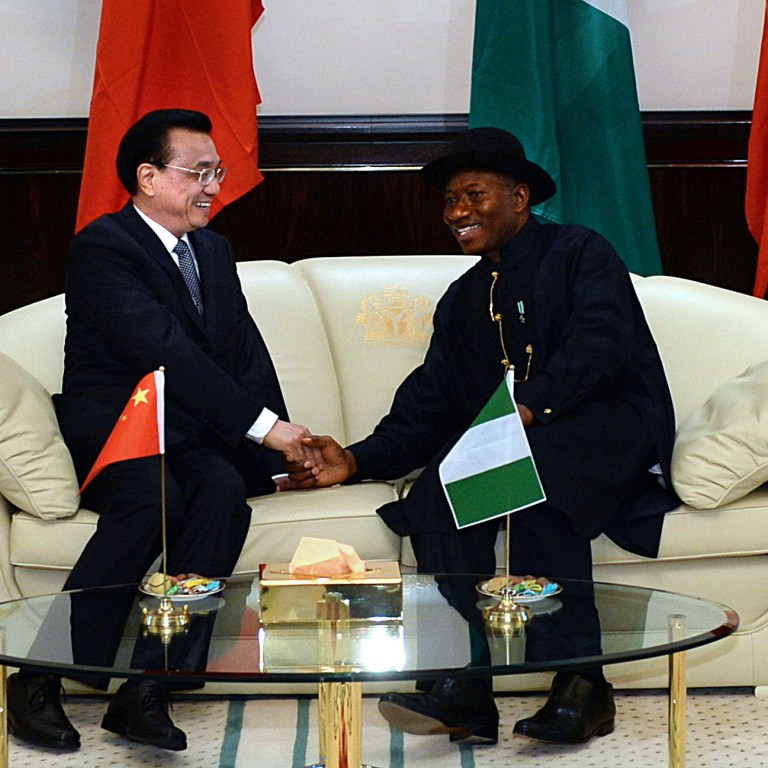
China pledges help to Nigeria’s hunt for Boko Haram militants
Premier Li Keqiang has pledged to assist Nigeria in its fight against Islamic militant group Boko Haram in what could be a rare anti-terror operation jointly conducted by the United States, European powers and China.
Premier Li Keqiang has pledged to assist Nigeria in its fight against Islamic militant group Boko Haram in what could be a rare anti-terror operation jointly conducted by the United States, European powers and China.
Li promised to provide “any useful information acquired by China’s satellites and intelligence services,” according to President Goodluck Jonathan after their talks in the capital Abuja on Wednesday.
The visiting premier did not give details on Chinese assistance to the country that has the largest economy in Africa but merely vowed to “oppose and fight terrorism”.
His pledge came as the US, Britain and France said they would send specialist teams to Nigeria to assist the Nigerian armed forces. Boko Haram’s recent attacks have caused a global outcry over the kidnapping of over 250 girls during the last month near the country’s border with Cameroon.
China could provide satellite imagery and equipment such as night vision goggles to the Nigerian military to help it monitor militant groups in convoys in the desert terrain of northeastern Nigeria, said Jacob Zenn, an Africa analyst at the Jamestown Foundation.
Zenn noted that China might have its own interests in dealing with the militant group because of its ties to the Pakistan-based Islamic Movement of Uzbekistan, which could pose a terrorist threat in the restive Xinjiang Uygur Autonomous Region.
He warned however that unconditional support to the Nigerian armed forces could backfire and exacerbate the conflict. “They might not even win and there might be more deaths on the civilian and military sides,” he said, adding that Nigeria’s main challenges would not be tackled by such international assistance.
“The Nigerian military is lacking human intelligence on the ground, it is lacking strategy, troops are under-resourced, and it needs to clean up its own house in terms of corruption,” he said.
Boko Haram is in the fifth year of its insurgency against the government in the country, with a fragile religious concord between Christians and Muslims. Fighting resulted in more than 1,000 casualties last year alone. The violence has also spilled over into neighbouring Cameroon, Chad, and Niger.
Three weeks ago, extremists seized a group of schoolgirls in the country’s volatile northeast, saying they were holding them as “slaves” and threatening to sell them.
The militants have since kidnapped more girls in the area and attacked a village, massacring scores of civilians.
Western governments divulged few details about the precise type of support offered to Nigeria but officials said intelligence from satellite imagery and possibly drone surveillance aircraft would be a crucial element.
Washington plans to send a team of less than 10 military personnel as well as specialists from the Justice Department and the FBI, US officials said.
“We’re moving swiftly to put in place a team at our embassy in Abuja that can provide military, law enforcement and information-sharing assistance in support of Nigeria’s efforts to find and free the girls,” State Department spokeswoman Jen Psaki told reporters.
The United States, which like France flies Reaper drones out of Niamey in Nigeria’s neighbour Niger, would not confirm if surveillance aircraft were part of the package of assistance.
“We’re discussing with the Nigerian government any type of information sharing arrangements that we can agree to,” Pentagon spokesman Colonel Steven Warren said.
The Nigerian embassy in Beijing and the Chinese embassy in Abuja could not be reached for comment.


.png?itok=arIb17P0)